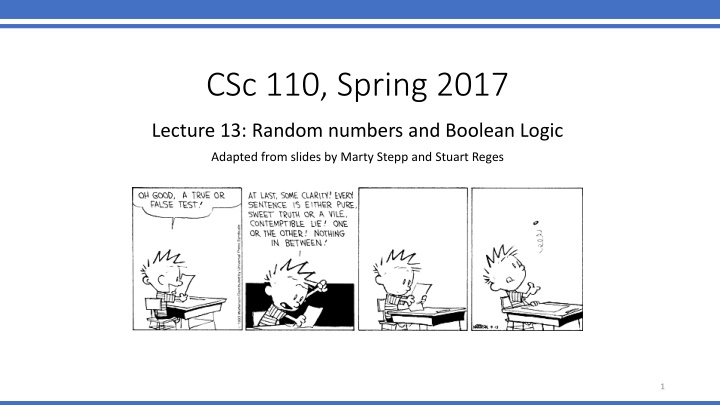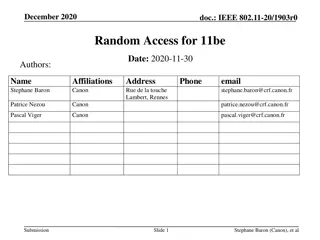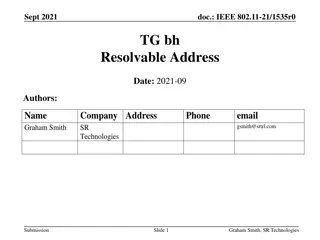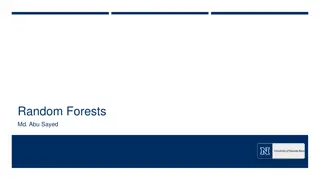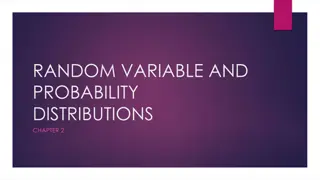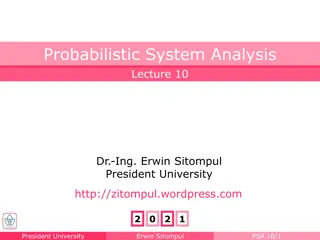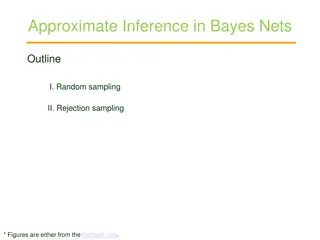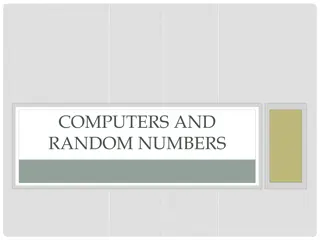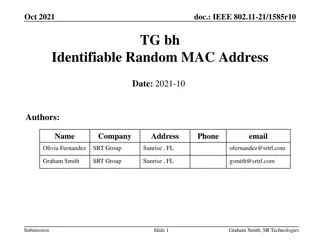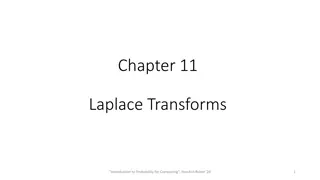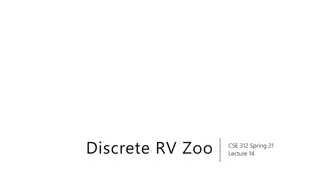Random Adding Game Program
Play a fun adding game by solving random addition problems with 2-5 numbers between 1 and 10. Earn 1 point for each correct answer and compete against yourself to reach a total score while learning Boolean logic concepts.
Download Presentation

Please find below an Image/Link to download the presentation.
The content on the website is provided AS IS for your information and personal use only. It may not be sold, licensed, or shared on other websites without obtaining consent from the author.If you encounter any issues during the download, it is possible that the publisher has removed the file from their server.
You are allowed to download the files provided on this website for personal or commercial use, subject to the condition that they are used lawfully. All files are the property of their respective owners.
The content on the website is provided AS IS for your information and personal use only. It may not be sold, licensed, or shared on other websites without obtaining consent from the author.
E N D
Presentation Transcript
CSc 110, Spring 2017 Lecture 13: Random numbers and Boolean Logic Adapted from slides by Marty Stepp and Stuart Reges 1
Random question Write a program that plays an adding game. Ask user to solve random adding problems with 2-5 numbers. The numbers to add are between 1 and 10 The user gets 1 point for a correct answer, 0 for incorrect. The program stops after 3 incorrect answers. 4 + 10 + 3 + 10 = 27 9 + 2 = 11 8 + 6 + 7 + 9 = 25 Wrong! The answer was 30 5 + 9 = 13 Wrong! The answer was 14 4 + 9 + 9 = 22 3 + 1 + 7 + 2 = 13 4 + 2 + 10 + 9 + 7 = 42 Wrong! The answer was 32 You earned 4 total points 2
Random answer - main # Asks the user to do adding problems and scores them. from random import * def main(): # play until user gets 3 wrong points = 0 wrong = 0 while (wrong < 3): result = play() # play one game if (result == 0): wrong += 1 else: points += 1 print("You earned " + str(points) + " total points.") 3
Random answer - play # Builds one addition problem and presents it to the user. # Returns 1 point if you get it right, 0 if wrong. def play(): # print the operands being added, and sum them num_operands = randint(2, 5) sum = randint(1, 10) print(sum, end='') for i in range(2, num_operands + 1): n = randint(1, 10) sum = sum + n print(" + " + str(n), end='') print(" = ", end='') # read user's guess and report whether it was correct guess = input() if (guess == sum): return 1 else: print("Wrong! The answer was " + str(total)) return 0 4
Type bool (Review) boolean: A logical type with only two values True and False. A logical test is an expression of type bool. As with other types, it is legal to: assign a bool value to a variable pass a bool value as a parameter return a bool value from function call a function that returns a bool value and use it as a test minor = age < 21 isProf = name.startswith("Prof") lovesCSE = True # allow only CS-loving students at least 21 old if (minor or isProf or not lovesCSE): print("Can't enter the club!") 5
Using booleans Why is type bool useful? Can capture a complex logical test result and use it later Can write a function that does a complex test and returns it Makes code more readable Can pass around the result of a logical test (as param/return) low_Sodium = sodium >= 35 and sodium < 140 low_Sugar = sugar >= 5 and sugar < 12 vitamin_C = c_count >= 100 and c_count <= 350 if ((low_Sodium and low_Sugar) or vitamin_Rich): print("Enjoy your healthy snack!") else: print("Eat your snack in moderation.") 6
Returning booleans def is_prime(n): factors = 0 for i in range(1, n + 1): if (n % i == 0): factors = factor + 1 if (factors == 2): return True else: return False Calls to functions returning booleans can be used as tests: if (is_prime(x)): ... 7
"Boolean Zen", part 1 Students new to booleans often test if a result is True: if (is_prime(x) == True): # bad ... But this is redundant. Preferred: if (is_prime(x)): # good ... A similar pattern can be used for a False test: if (is_prime(x) == False): # bad if (not is_prime(x)): # good 8
"Boolean Zen", part 2 Functions that return booleans often have an if/else that returns True or False: def both_odd(n1, n2): if (n1 % 2 != 0 and n2 % 2 != 0): return True else: return False Can this be shortened and improved? 9
Solution w/ variable assignment We could store the result of the logical test. def both_odd(n1, n2): test = n1 % 2 != 0 and n2 % 2 != 0 if (test): # test == True return True else: # test == False return False Notice: Whatever test is, we want to return that. If test is True, we want to return True. If test is False, we want to return False. 10
Solution w/ "Boolean Zen" Observation: The if/else is unnecessary. The variable test is assigned a value of type bool; its value is exactly what you want to return. So return that! def both_odd(n1, n2): test = n1 % 2 != 0 and n2 % 2 != 0 return test An even shorter version: We don't even need the variable test. We can just perform the test and return its result in one step. def both_odd(n1, n2): return n1 % 2 != 0 and n2 % 2 != 0 11
"Boolean Zen" template Replace def name(parameters): if (test): return True else: return False with def name(parameters): return test 12
Improve the is_prime function How can we fix this code? def is_prime(n): factors = 0 for i in range(1, n + 1): if (n % i == 0): factors = factors + 1 if (factors == 2): return True else: return False 13
Logic Question Consider the statement: It is not true that he took Art History and Physics 101 Is this an equivalent statement? He did not take Art History or he did not take Physics 101 14
De Morgan's Laws De Morgan's Laws: Rules used to negate boolean tests involving and and or. Useful when you want the opposite of an existing test. Original Expression a and b a or b Negated Expression not a or not b not a and not b Alternative not(a and b) not(a or b) Example: Original Code Negated Code if (x == 7 and y > 3): ... If not(x == 7 and y > 3): if (x =! 7 or y <= 3): 15
Boolean practice questions Write a function is_vowel(c) that returns True if the 1 character string c is a vowel (a, e, i, o, or u) or False otherwise. Ignore case. is_vowel("q") returns False is_vowel("A") returns True is_vowel("e") returns True Change the above function into is_non_vowel(c) that returns True if c is any character except a vowel and False otherwise. is_non_vowel("q") returns True is_non_vowel("A") returns False is_non_vowel("e") returns False 16
Boolean practice answers # Enlightened version. I have seen the true way (and false way) def is_vowel(c): c = c.lower() # allows testing for only lower case return c == 'a' or c == 'e' or c =='i' or c == 'o' or c == 'u' # Enlightened "Boolean Zen" version def is_non_vowel(c): c = c.lower() return not(c == 'a' or c == 'e' or c =='i' or c == 'o' or c == 'u') # or, return not is_vowel(c) 17
When to return? Consider a function with a loop and a return value: When and where should the function return its result? Write a function seven that uses randint to draw up to ten lotto numbers from 1-30. If any of the numbers is a lucky 7, the function should immediately return True. If none of the ten are 7 it should return False. The function should print each number as it is drawn. 15 29 18 29 11 3 30 17 19 22 (first call) 29 5 29 4 7 (second call) 18
Flawed solution # Draws 10 lotto numbers; returns True if one is 7. def seven(): for i in range(1, 11): num = randint(1, 30) print(str(num) + " ", end='') if (num == 7): return True; else: return False; The function always returns immediately after the first draw. If the draw isn't a 7, we need to keep drawing (up to 10 times). 19
Returning at the right time # Draws 10 lotto numbers; returns True if one is 7. def seven(): for i in range(1, 11): num = randint(1, 30) print(str(num) + " ", end='') if (num == 7): # found lucky 7; can exit now return True return False # if we get here, there was no 7 Returns True immediately if 7 is found. If 7 isn't found, the loop continues drawing lotto numbers. If all ten aren't 7, the loop ends and we return False. 20
Sidebar Write a function digit_sum(n) that accepts an integer parameter and returns the sum of its digits. Assume that the number is non-negative. Example: digit_sum(29107) returns 19 (19 is the sum of 2+9+1+0+7) Hint: Use the % operator to extract a digit from a number. Hint: Use the // operator to remove the last digit 21
Summing digits answer def digit_sum(n): sum = 0 while (n > 0): sum = sum + (n % 10) # add last digit to sum n = n // 10 # remove last digit from n return sum 22
Boolean return questions has_an_odd_digit : returns True if any digit of an integer is odd. has_an_odd_digit(4822116) returns True has_an_odd_digit(2448) returns False all_digits_odd : returns True if every digit of an integer is odd. all_digits_odd(135319) returns True all_digits_odd(9174529) returns False is_all_vowels : returns True if every char in a string is a vowel. is_all_vowels("eIeIo") returns True is_all_vowels("oink") returns False 23
Boolean return answers def has_an_odd_digit(n): while (n != 0): if (n % 2 != 0): # check whether last digit is odd return True n = n // 10 return False def all_digits_odd(n): while (n != 0) : if (n % 2 == 0): # check whether last digit is even return False n = n // 10 return True def is_all_vowels(s): for i in range(0, len(s)): letter = s[i: i + 1] if (not is_vowel(letter)): return False return True 24
